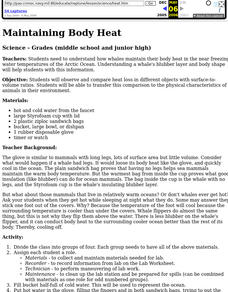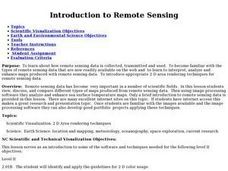Curated OER
Ocean Morse Code
Students gain knowledge of the maritime importance of Morse code and enjoy applying this information to decipher Morse code messages from other students.
Curated OER
the New Explorers:Into the Depths
Learners explore the self preservation mechanism that is inherent in the Great Lakes. They examine how scientists are studying Great Lakes, and what their predictions are for these national treasures.
Curated OER
Head to Foot
Students describe the body form and major anatomical structures of squids and describe some unusual or unique features of newly-discovered deep water squid species. They infer what types of food squids use from their anatomical features.
Curated OER
Maintaining Body Heat
Students observe and compare heat loss in different objects with surface-to-volume ratios. They transfer this comparison to the physical characteristics of animals in their environment. They focus on how whales maintain their body heat.
Curated OER
Water Density and Stability Lab
Students observe how different water densities and salinity control the depth at which different water masses occur. Submarines are used as a case study. This is a well-designed with an excellent worksheet.
Curated OER
Introduction to Remote Sensing
Learners view, discuss, and compare different types of maps produced from remote sensing data. They use image processing software to analyze and enhance sea surface temperature maps.
Curated OER
Health, Pollution, and Safety: Why Should We Care?
Students examine the impact of reducing the carbon dioxide emissions. They identify ways alternative fuels can lessen the effect of emissions on communities. Working in teams they conduct research from various community and Internet...
Curated OER
Beach Zonation
Students identify and separate the different zones of the beach by observation. They investigate beach zonation by gathering and comparing sand samples gathered from different areas of the beach.
Curated OER
Estuarine Currents
Students explore an estuarine system to gather data on density driven currents. This type of current is contrasted with temperature and wind driven currents.
Curated OER
OCEAN PAINTINGS
Fifth graders research animal life in a coral reef. They learn and use the wax-resist technique for painting, and create a picture of an ocean animal.
Curated OER
Water: On the Surface and in the Ground
Learners explore the differences between surface water and ground water. They collect data using maps and graphs and investigate a Texas river basin and a nearby aquifer. They complete a written report including maps and data regarding...
Curated OER
What's Left to Explore-Space and the Ocean Floor
Students describe unique exploration studies of the ocean floor and space. They utilize research skills and write summaries of research studies using the Internet. Students answer a variety of questions over their research findings.
Curated OER
Sharkland Wiki
Young scholars, while researching the waters around southern Africa and viewing a video of the episode "Sharkland" from Thirteen's series NATURE, critique reliability of online resources and analyze the various components of a wiki. They...
Curated OER
Global Change — Change and Cycles Where Land, Air and Water Meet
Young scholars participate in an experiment to define a parts-per-billion solution. For this ecology lesson, students select a second substance to create a parts-per-billion solution and observe and record their results. Young scholars...
Curated OER
Pipeline to the Coral Reefs
Young scholars discuss the relationship of density to stratification. For this marine science lesson, students create a model of upwelling events using cold and warm water. They discuss how water phenomena affect coral reefs.
Other popular searches
- Oceanography Science
- Oceanography Activities
- Oceanography Vocabulary
- Oceanography Tides
- Introduction to Oceanography
- Oceanography Exploration
- Oceanography Lab
- History of Oceanography
- Careers in Oceanography
- Oceanography Shells
- Geological Oceanography
- Oceanography Careers
















